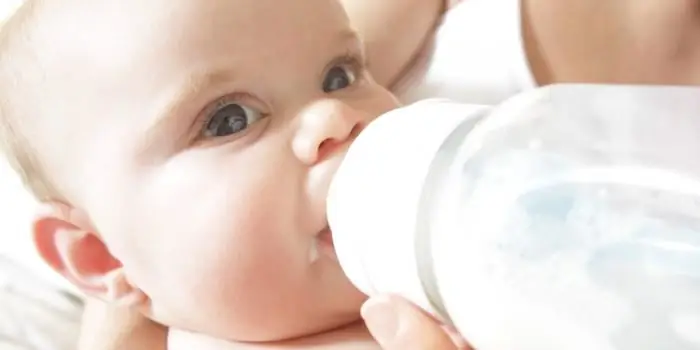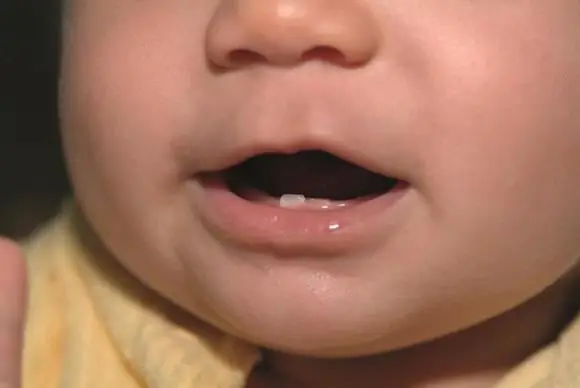2026 Author: Priscilla Miln | miln@babymagazinclub.com. Last modified: 2025-01-22 17:55:18
Dental he alth depends on proper oral care from infancy. But parents usually do not look into the child's mouth until six months and begin to worry only when his teeth are cut. If the baby is he althy, teething does not create any special problems, but it still worries parents.
When do babies teeth?
Usually this happens at six months. Some children earlier, others later. Before teething begins, the activity of the salivary glands intensifies in the child, and saliva often flows. All teeth are already laid in the gums of the child and erupt gradually. To care for the baby's oral cavity is necessary before the teeth appear. After all, inflammation and microbes in the mouth make this process much more painful. Use a cotton pad to wipe the child's gums with a weak solution of baking soda.
What is the most common way of teething?

Usually, the front teeth appear first on the lower gum, and then on the upper. Teeth erupt in pairs, may come out crooked and at intervals, but most often then straighten. For teething, there is the so-called rule of four: four teeth every four months. By the age of two and a half, everything is usually grown20 milk teeth. By the age of one, a child should have 8 teeth. A delay in their eruption may be associated with an unfavorable course of pregnancy: malnutrition of the mother, her diseases, or taking some medications.
What problems can parents face when their child is teething?
1. Salivation. Saliva flows constantly, this can lead to inflammation of the skin on the chin and around the mouth, and a rash appears on the face. It is necessary to carefully wash off the saliva with warm water, blot the skin with a napkin. If irritation occurs, you can lubricate the skin with almond or coconut oil or baby cream.

2. Irritability. A child, previously calm, may often wake up at night, cry, he may have a fever. This is due to inflammation of the gums, which can become red or swollen and often cause pain to the baby. You can help the child by lubricating the gums with special products.
3. The baby puts everything in his mouth. If there is no severe inflammation and pain, the gums still cause trouble for the child - they itch. The child takes into his mouth everything he can reach. When teeth are cut, you need to carefully monitor the baby. It is better to buy him special teethers. Now there are a lot of different ones - and

combined with rattles, and in the form of animal figurines, but you can also use a regular rubber ring with pimples. There are models filled with a special gel. If you hold them under cold water, they will stay cool for a long time, help relieve inflammation and pain ingums. You can massage your baby's gums with a clean finger in a circular motion.
4. Fever, diarrhea and other symptoms. But they may not be related to the teeth, it could be a cold or a reaction to inappropriate food.
However, for many babies, the time when teeth are being cut is painless. And mom notices her teeth only when she touches them with a spoon during feeding. So that the child does not suffer from the process of teething, follow all the recommendations of doctors and try to breastfeed your baby.
Recommended:
How long does the temperature last when teething? What temperature during teething is acceptable?

In this article I would like to talk about how long the temperature lasts during teething, and also what it can be, how you can help the baby with medicines and in other ways, what you should not do. Read all about it in the text below
Symptoms of teething in children, or How to help a baby in a crucial period

Has the baby become capricious or does he look at his parents with universal longing, without ceasing to gnaw on toys? These are the symptoms of teething in children, or rather, only a part of them. In order to identify and facilitate this crucial period in the life of a toddler in time, adults must clearly know which signs correspond to it and when to expect them
When children are teething: timing, signs, how to help a baby

In the first months of life, every baby smiles at his parents with a gentle toothless smile. And suddenly adults discover a small whitish bulge on the gums. This means that the baby begins to cut teeth. The first one will appear, and in two or three weeks the next one will join it. And already in three years, everything will grow in the crumbs. When teeth are cut in children, how to understand in advance and what to do in this case, we learn from this article
Baby food "Baby". "Baby" - baby food from birth

So you became a mother! But this joyful event can be overshadowed by the impossibility of breastfeeding. There are many different reasons that affect this natural physiological process, but whatever they are, you have to think about how to feed the baby. And in this case, infant milk formulas come to the rescue. One of the most popular is baby food "Malyutka"
Symptoms of teething in a child. How to help a child with teething

Teething starts at about 6-9 months of age. As a rule, these are the lower incisors. By 16-22 months it is time for the upper and lower canines. Most mothers know that teething these teeth is not easy. What are the symptoms of teething teeth in a child? How to lighten them?

